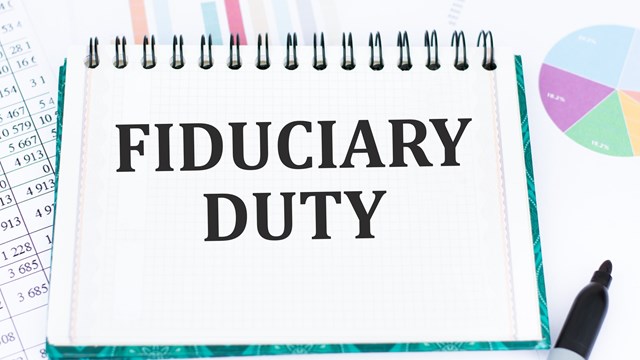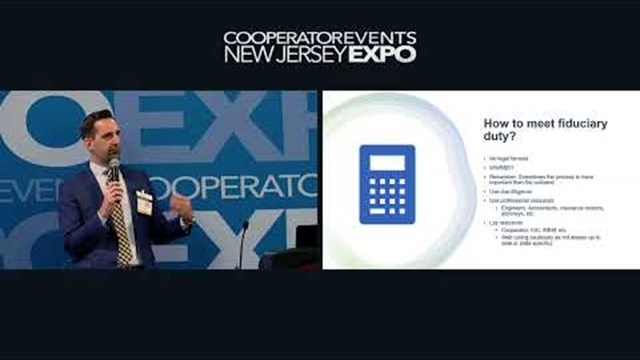
Q. I live in a 64-unit condominium. The board of directors is in a lawsuit for not following its fiduciary responsibilities. The treasurer resides out of state and has all maintenance payments sent to her monthly. She then is the ONLY person signing checks for all purchases, without other board members’ knowledge. She INSISTS she is allowed to do this. So is it true? Can she do this?
—Sensing Something’s Amiss
A. “You state that your condominium’s board of directors is being sued for violation of their fiduciary responsibilities,” says Anne Ward, an attorney with the Newark firm of Ehrlich, Petriello, Gudin & Plaza. “Apparently, the treasurer is the only officer signing checks for all of the association’s purchases and does so without any oversight. To complicate the situation, the treasurer is living out of state. I am unsure if these facts are the basis of the lawsuit or if other acts or omissions are at issue as well. Whatever the basis to the suit, I presume that you are asking if the delegation of power to the treasurer is appropriate or legal.
“To begin, the New Jersey Condominium Law (‘the Act’), N.J.S.A 46:8B-12.1 provides that the board of directors of a condominium is responsible for the administration of the association. N.J.S.A. 46:8B-13 requires the bylaws to set forth the condominium’s form of administration. Section 46:8B-14 of the Act sets forth the duties of the association (which acts through its officers or governing board).
“That section provides that the association is responsible for:
‘(b) The assessment and collection of funds for common expenses and the payment thereof.
‘(g) The maintenance of accounting records, in accordance with generally accepted accounting principles, open to inspection at reasonable times by unit owners. Such records shall include:
‘i) A record of all receipts and expenditures.
‘ii) An account for each unit setting for any shares of common expenses or other charges due, the due dates thereof, the present balance due, and any interest in common surplus.’
“Section 46:8B-15 of the Act outlines more detailed requirements for the financial management of the association. It provides:
‘All funds collected by an association shall be maintained separately in the association’s name. For investment purposes only, reserve funds may be comingled with operating funds of the association. Comingled operating and reserve funds shall be accounted for separately, and a comingled account shall not, at any time, be less than the amount identified as reserve funds. A manager or business entity managing a condominium, or an agent, employee, officer, or director of an association, shall not comingle any association funds with his or her funds or with the funds of any other condominium association or the funds of another association as defined in Section 3 of P.L. 1977, c419 (C. 45:22A-23).’
“Clearly, the governing board is responsible for the financial management of the condominium. Clearly, the governing board is accountable to its members and must be transparent in all of its financial transactions.
“In addition, and quite notably, section 46:8B-14 (j) of the Act also requires that:
‘(i) an association shall exercise its powers and discharge its functions in a manner that protects and furthers or is not inconsistent with the health, safety, and general welfare of the residents of the community.’
“A condominium is subject to the Non-Profit Corporations Act, N.J.S.A. 15A:1-1 et seq., in addition to the Act. Thus, the governing board has a fiduciary duty to the association such as a corporate officer does to a corporation. The board also has a fiduciary responsibility to all its members. While bylaws do not specifically provide for the degree of financial oversight required of a board, the board’s fiduciary responsibility includes a duty to act with common sense and to manage the finances of the condominium in a prudent and sensible manner.
“The New Jersey Supreme Court in the case of Frances v. United Jersey Bank, 87 N.J. 15, 30-31 (1981) discusses the standard of care the board owes in the execution of its duties:
‘Underlying... is the principle that directors must discharge their duties in good faith and act as ordinarily prudent persons would under similar circumstances in like positions. Although specific duties in a given case can be determined only after consideration of all the circumstances, the standard of ordinary care is the wellspring from which those more specific duties flow.’
“The Supreme Court explained that all the members of the governing board, such as your board, must keep informed about the business of the corporation. Moreover, an officer of the board cannot insulate himself or herself from responsibility or liability by their indifference or non-participation. In other words, the board has a ‘duty to look.’ (Id at 31.)
‘... a director cannot protect himself behind a paper shield bearing the motto, “dummy director.”’ Id. at 34.
“Board members may find themselves personally liable for any losses which occur as a result of their negligence. The Frances Court has this to say about awarding damages which result from board members’ negligence:
‘Such a judicial determination involves not only consideration of causation in fact and matters of policy, but also common sense and logic. [Citation omitted]. The act or failure to act must be a substantial factor in producing the harm. [Citation omitted].’ [Emphasis added]. Id. at 45.
“The treasurer may very well have been vested by the board with sole responsibility for this aspect of the association’s finances. But the scenario you describe appears on its face to be unwise —and it certainly may be a violation of a board’s fiduciary responsibility. It is not farfetched to conceive of a situation where the treasurer simply absconds with the maintenance fees, and/or applies those fees in an illegal or inappropriate manner. The board’s apparent lack of diligence would clearly be a violation of its fiduciary responsibility.”









Leave a Comment